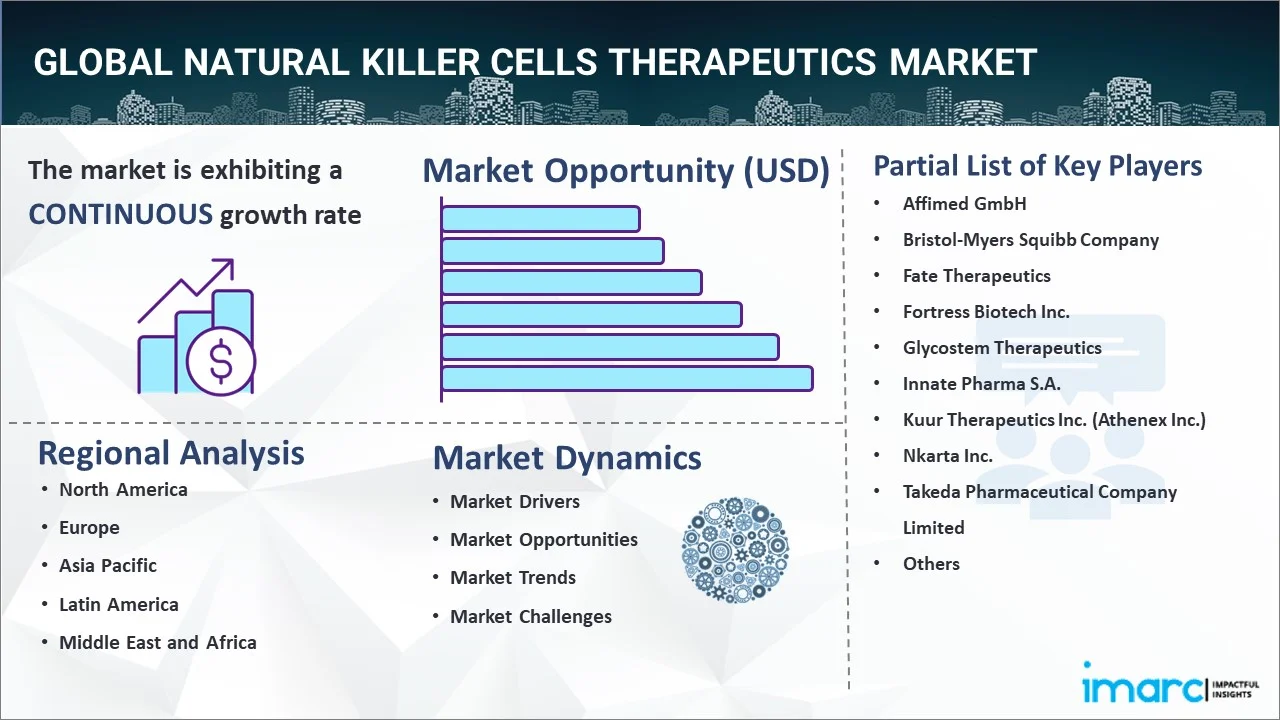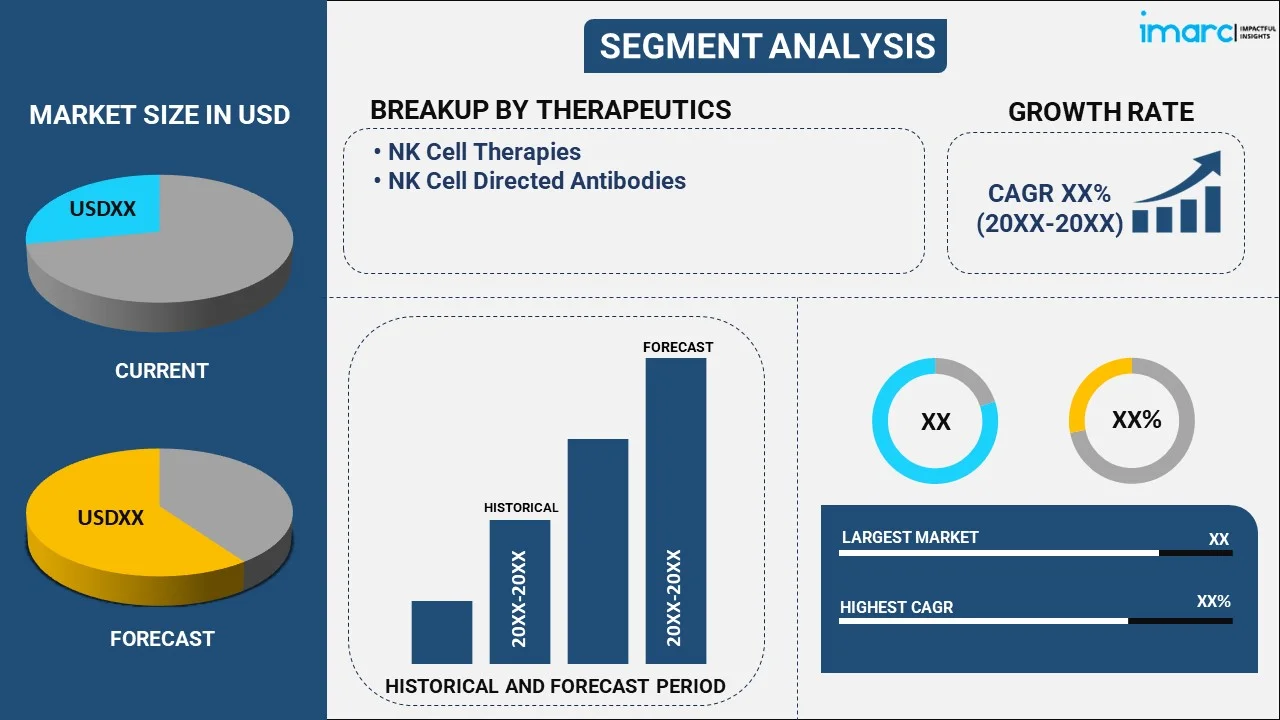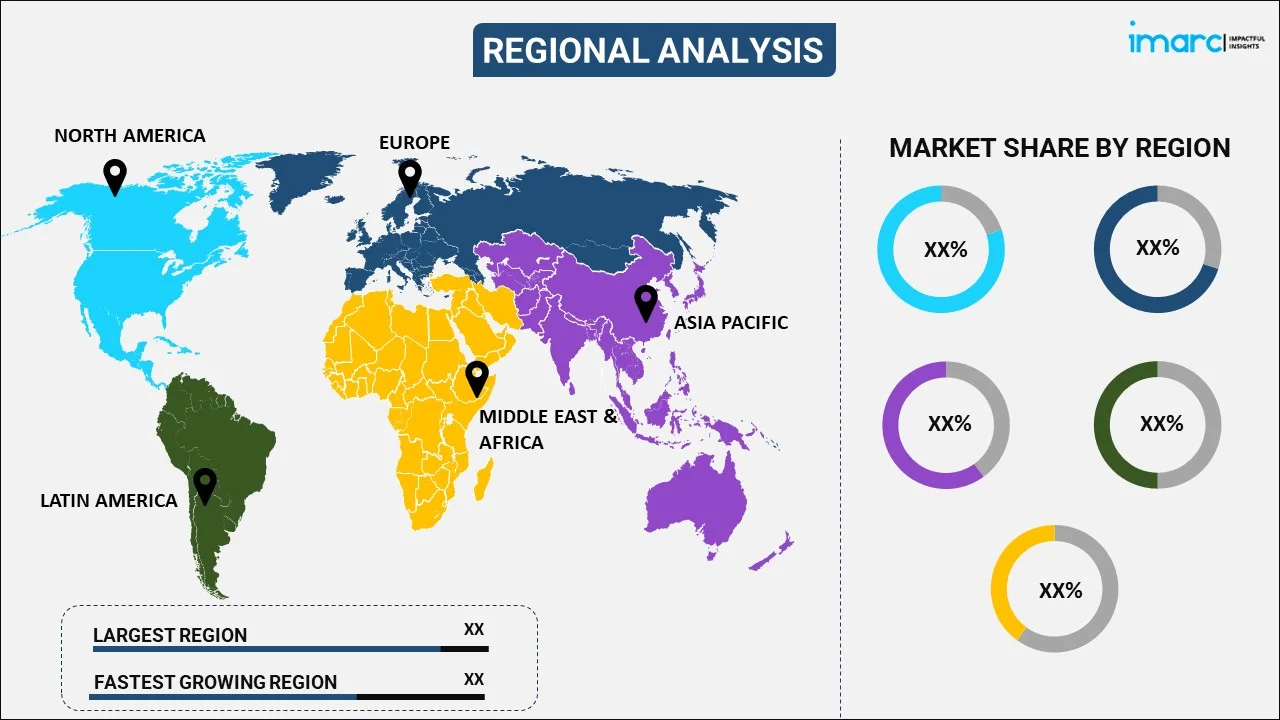
Natural Killer Cells Therapeutics Market Report by Therapeutics (NK Cell Therapies, NK Cell Directed Antibodies), Application (Cancer, Gastrointestinal Diseases, Immunoproliferative Disorders, and Others), End User (Hospitals, Research Centers and Institutes, and Others), and Region 2025-2033
Global Natural Killer Cells Therapeutics Market:
The global natural killer cells therapeutics market size reached USD 3.2 Billion in 2024. Looking forward, IMARC Group expects the market to reach USD 8.6 Billion by 2033, exhibiting a growth rate (CAGR) of 11.8% during 2025-2033. The rising risks of developing cancer, along with the expanding geriatric population, are propelling the market.
|
Report Attribute
|
Key Statistics
|
|---|---|
|
Base Year
|
2024
|
|
Forecast Years
|
2025-2033
|
|
Historical Years
|
2019-2024
|
|
Market Size in 2024
|
USD 3.2 Billion |
|
Market Forecast in 2033
|
USD 8.6 Billion |
| Market Growth Rate 2025-2033 | 11.8% |
Natural Killer Cells Therapeutics Market Analysis:
- Major Market Drivers: The growing number of individuals with cancer, infectious diseases, and liver disorders, on account of the lack of physical activities, unhealthy dietary patterns, and the increasing air pollution levels, is catalyzing the market.
- Key Market Trends: Extensive investments in clinical studies that focus on tumor-targeted antibody strategies to minimize risks and toxicities are among the emerging trends fueling the market.
- Competitive Landscape: Some of the prominent companies in the global market include Affimed GmbH, Bristol-Myers Squibb Company, Fate Therapeutics, Fortress Biotech Inc., Glycostem Therapeutics, Innate Pharma S.A., Kuur Therapeutics Inc. (Athenex Inc.), Nkarta Inc., Takeda Pharmaceutical Company Limited, and Ziopharm Oncology Inc., among many others.
- Geographical Trends: North America exhibits a clear dominance in the market, owing to numerous financial schemes by government agencies across the region for cancer patients.
- Challenges and Opportunities: One of the challenges hindering the market is the difficulty in manufacturing processes. This can be overcome by improving scalable production methods to ensure quality and efficacy.

Natural Killer Cells Therapeutics Market Trends:
Increasing Popularity of Combination Therapies
Combining NK cell therapies with other treatment modalities to enhance therapeutic efficacy is gaining extensive traction. For example, Innate Pharma's Lumoxiti, an anti-CD22 immunotoxin, is adopted in conjunction with NK cells to destroy and target CD22-expressing cancer cells in hairy cell leukemia. Moreover, this approach leverages the strengths of both therapies. Besides this, in May 2024, Coeptis Therapeutics Holdings, Inc., a biopharmaceutical company developing innovative cell therapy platforms for autoimmune, cancer, and infectious diseases, introduced SNAP-CAR NK cells to target multiple antigens.
Growing Regulatory Approval
The rising focus among government agencies on enhancing the reliability and efficiency of NK cell production is acting as a significant growth-inducing factor. Furthermore, they are encouraging the translation of laboratory research into viable clinical therapies, which will continue to fuel the market over the foreseeable future. For example, in April 2024, Ingenium Therapeutics, a leading innovator in next-generation NK cell therapies, received an Orphan Drug Designation from the U.S. Food and Drug Administration (FDA) for the treatment of acute myeloid leukemia (AML).
Rising Demand for Real-Time Monitoring
The widespread integration of real-time monitoring and data analytics into NK cell therapy development is enhancing treatment precision and patient outcomes. Moreover, platforms like Bio-Techne's Ella system enable precise monitoring of cytokine production during NK cell expansion, thereby ensuring optimal cell functionality. Real-time analytics also allow researchers to adjust culture conditions dynamically, which aids in improving the quality and effectiveness of the NK cells produced. This is positively influencing the market.
Global Natural Killer Cells Therapeutics Industry Segmentation:
IMARC Group provides an analysis of the key trends in each segment of the market, along with the natural killer cells therapeutics market forecast at the global, regional, and country levels for 2025-2033. Our report has categorized the market based on therapeutics, application, and end user.
Breakup by Therapeutics:

- NK Cell Therapies
- NK Cell Directed Antibodies
Currently, NK cell directed antibodies hold the majority of the total market share
The report has provided a detailed breakup and analysis of the market based on the therapeutics. This includes NK cell therapies and NK cell directed antibodies. According to the report, NK cell directed antibodies represented the largest market segmentation.
NK cell directed antibodies target natural killer cells to enhance their ability to recognize and destroy cancer cells. For example, Affimed's AFM13, a bispecific NK cell engager, targets CD30 on cancer cells and CD16A on NK cells.
Breakup by Application:
- Cancer
- Gastrointestinal Diseases
- Immunoproliferative Disorders
- Others
Cancer currently exhibits a clear dominance in the market
The report has provided a detailed breakup and analysis of the market based on the application. This includes cancer, gastrointestinal diseases, immunoproliferative disorders, and others. According to the report, cancer represented the largest market segmentation.
The inflating need for effective cancer treatments drives the segment's growth. Recent product launches have underscored the potential of NK cell-based therapies in oncology. For instance, Fate Therapeutics' FT596 is an off-the-shelf, iPSC-derived NK cell therapy designed to target multiple cancer types, including B-cell malignancies.
Breakup by End User:
- Hospitals
- Research Centers and Institutes
- Others
Currently, research centers and institutes hold the majority of the total market share
The report has provided a detailed breakup and analysis of the market based on the end user. This includes hospitals, research centers and institutes, and others. According to the report, research centers and institutes represented the largest market segmentation.
Research centers and institutes offer high-quality reagents and technologies that streamline NK cell research, which is increasing the natural killer cells therapeutics market share. For example, Bio-Techne's Cloudz Human NK Cell Expansion Kit allows researchers to expand NK cells ex vivo efficiently.
Breakup by Region:

- North America
- United States
- Canada
- Asia-Pacific
- China
- Japan
- India
- South Korea
- Australia
- Indonesia
- Others
- Europe
- Germany
- France
- United Kingdom
- Italy
- Spain
- Russia
- Others
- Latin America
- Brazil
- Mexico
- Others
- Middle East and Africa
North America exhibits a clear dominance in the market
The market research report has also provided a comprehensive analysis of all the major regional markets, which include North America (the United States and Canada); Asia Pacific (China, Japan, India, South Korea, Australia, Indonesia, and others); Europe (Germany, France, the United Kingdom, Italy, Spain, Russia, and others); Latin America (Brazil, Mexico, and others); and the Middle East and Africa. According to the report, North America accounted for the largest market share.
Advancements in biotechnology and a strong focus on innovative cancer treatments are primarily catalyzing the market in North America. According to the IMARC, the United States cancer immunotherapy market size is projected to exhibit a growth rate (CAGR) of 10.90% during 2024-2032. Besides this, collaborations between biotech firms are strengthening the regional market.
Competitive Landscape:
The market research report has provided a comprehensive analysis of the competitive landscape. Detailed profiles of all major market companies have also been provided. Some of the key players in the market include:
- Affimed GmbH
- Bristol-Myers Squibb Company
- Fate Therapeutics
- Fortress Biotech Inc.
- Glycostem Therapeutics
- Innate Pharma S.A.
- Kuur Therapeutics Inc. (Athenex Inc.)
- Nkarta Inc.
- Takeda Pharmaceutical Company Limited
- Ziopharm Oncology Inc.
(Please note that this is only a partial list of the key players, and the complete list is provided in the report.)
Natural Killer Cells Therapeutics Market Recent Developments:
- May 2024: Coeptis Therapeutics Holdings, Inc., a biopharmaceutical company developing innovative cell therapy platforms for autoimmune, cancer, and infectious diseases, introduced SNAP-CAR NK cells to target multiple antigens.
- April 2024: Ingenium Therapeutics, a leading innovator in next-generation NK cell therapies, received an Orphan Drug Designation from the U.S. Food and Drug Administration (FDA) for the treatment of acute myeloid leukemia (AML).
- January 2024: Indapta Therapeutics, Inc., a privately held biotechnology company developing IDP-023, a natural killer (NK) cell therapeutics for the treatment of cancer, announced the treatment of the first patients in its Phase 1 trial in multiple myeloma and non-Hodgkin’s lymphoma.
Natural Killer Cells Therapeutics Market Report Scope:
| Report Features | Details |
|---|---|
| Base Year of the Analysis | 2024 |
| Historical Period | 2019-2024 |
| Forecast Period | 2025-2033 |
| Units | Billion USD |
| Scope of the Report | Exploration of Historical Trends and Market Outlook, Industry Catalysts and Challenges, Segment-Wise Historical and Predictive Market Assessment:
|
| Therapeutics Covered | NK Cell Therapies, NK Cell Directed Antibodies |
| Applications Covered | Cancer, Gastrointestinal Diseases, Immunoproliferative Disorders, Others |
| End Users Covered | Hospitals, Research Centers and Institutes, Others |
| Regions Covered | Asia Pacific, Europe, North America, Latin America, Middle East and Africa |
| Countries Covered | United States, Canada, Germany, France, United Kingdom, Italy, Spain, Russia, China, Japan, India, South Korea, Australia, Indonesia, Brazil, Mexico |
| Companies Covered | Affimed GmbH, Bristol-Myers Squibb Company, Fate Therapeutics, Fortress Biotech Inc., Glycostem Therapeutics, Innate Pharma S.A., Kuur Therapeutics Inc. (Athenex Inc.), Nkarta Inc., Takeda Pharmaceutical Company Limited, Ziopharm Oncology Inc., etc. |
| Customization Scope | 10% Free Customization |
| Post-Sale Analyst Support | 10-12 Weeks |
| Delivery Format | PDF and Excel through Email (We can also provide the editable version of the report in PPT/Word format on special request) |
Key Benefits for Stakeholders:
- IMARC's industry report offers a comprehensive quantitative analysis of various market segments, historical and current market trends, market forecasts, and dynamics of the natural killer cells therapeutics market from 2019-2033.
- The research report provides the latest information on the market drivers, challenges, and opportunities in the global natural killer cells therapeutics market.
- The study maps the leading, as well as the fastest-growing, regional markets. It further enables stakeholders to identify the key country-level markets within each region.
- Porter's five forces analysis assists stakeholders in assessing the impact of new entrants, competitive rivalry, supplier power, buyer power, and the threat of substitution. It helps stakeholders to analyze the level of competition within the natural killer cells therapeutics industry and its attractiveness.
- The competitive landscape allows stakeholders to understand their competitive environment and provides insight into the current positions of key players in the market.
Key Questions Answered in This Report
The global natural killer cells therapeutics market was valued at USD 3.2 Billion in 2024.
We expect the global natural killer cells therapeutics market to exhibit a CAGR of 11.8% during 2025-2033.
The continuous development of novel methods and technologies by various healthcare organizations for boosting the immune response of cancer patients through allogeneic, off-the-shelf NK cell-based therapies, is primarily driving the global natural killer cells therapeutics market.
The sudden outbreak of the COVID-19 pandemic has led to the rising demand for natural killer cells therapeutics for emergency treatment of mild-to-moderate coronavirus infection, thereby positively impacting the global market.
Based on the therapeutics, the global natural killer cells therapeutics market can be segmented into NK cell therapies and NK cell directed antibodies. Currently, NK cell directed antibodies hold the majority of the total market share.
Based on the application, the global natural killer cells therapeutics market has been divided into cancer, gastrointestinal diseases, immunoproliferative disorders, and others. Among these, cancer currently exhibits a clear dominance in the market.
Based on the end user, the global natural killer cells therapeutics market can be categorized into hospitals, research centers and institutes, and others. Currently, research centers and institutes account for the largest market share.
On a regional level, the market has been classified into North America, Asia-Pacific, Europe, Latin America, and Middle East and Africa, where North America currently dominates the global market.
Some of the major players in the global natural killer cells therapeutics market include Affimed GmbH, Bristol-Myers Squibb Company, Fate Therapeutics, Fortress Biotech Inc., Glycostem Therapeutics, Innate Pharma S.A., Kuur Therapeutics Inc. (Athenex Inc.), Nkarta Inc., Takeda Pharmaceutical Company Limited, and Ziopharm Oncology Inc.
Need more help?
- Speak to our experienced analysts for insights on the current market scenarios.
- Include additional segments and countries to customize the report as per your requirement.
- Gain an unparalleled competitive advantage in your domain by understanding how to utilize the report and positively impacting your operations and revenue.
- For further assistance, please connect with our analysts.
 Request Customization
Request Customization
 Speak to an Analyst
Speak to an Analyst
 Request Brochure
Request Brochure
 Inquire Before Buying
Inquire Before Buying




.webp)




.webp)












